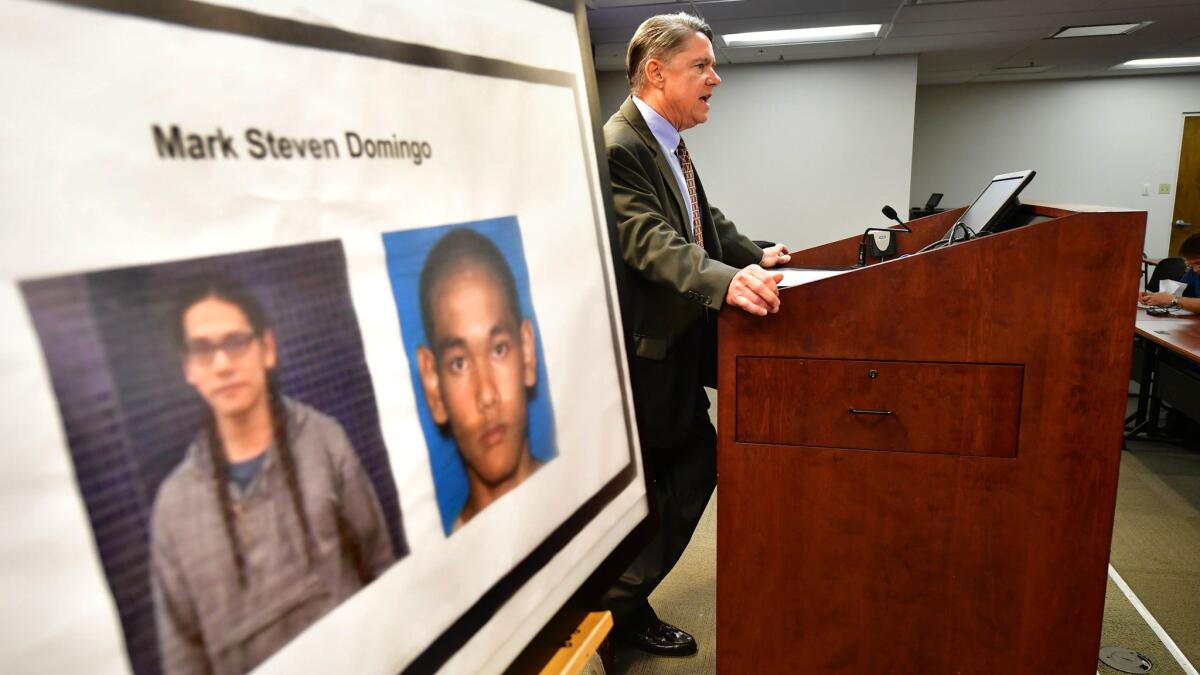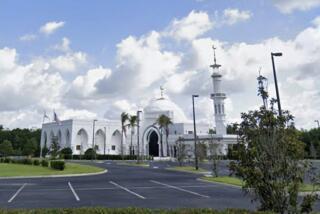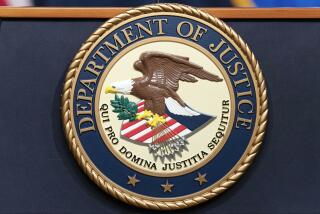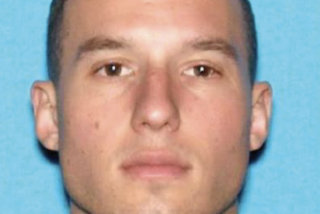L.A. suspect in terror plot lived quiet life but spewed online hate, authorities say

Mark Steven Domingo lived in a quiet Reseda neighborhood with his family.
But online, authorities allege he vented hate, vowing to launch terrorist attacks as revenge for last month’s massacre at two New Zealand mosques.
The 26-year-old U.S. Army veteran was charged with attempting to provide material support to terrorists. If convicted as charged, he faces 15 years in prison. He remains in federal custody pending a May 31 court hearing.
Here is what we know about him:
Military service
Domingo had been stationed at Ft. Campbell, Ky., and served in Afghanistan from September 2012 to January 2013. Authorities said he left the armed forces shortly after.
A Department of Defense representative did not immediately respond to a request for comment Tuesday.
A law enforcement official who spoke on the condition of anonymity said Domingo did not receive an honorable discharge.
A source told The Times that there was an incident in Afghanistan that led to Domingo’s discharge but could not say more.
Conversion to Islam
It was unclear when Domingo converted to Islam. According to a federal affidavit, he first posted a video declaring his faith on March 2. He began expressing a desire to see Americans killed a short time after, the affidavit said.
Domingo’s brother, James, told the Los Angeles Daily News that Domingo attended a mosque not far from the family’s Reseda home.
“I thought maybe my brother finally found some sort of guidance in this world,” he said. “Like anybody else, I don’t want to assume a thing when someone is going into a new religion.”
Hate writings
Domingo had been under surveillance for weeks after he expressed a desire in an online post to commit acts of violence, according to the 30-page affidavit unsealed Monday. Specifically, he wanted revenge for Muslims killed during a mass shooting in New Zealand last month, according to court documents.
“I feel like I should make a christians life miserable tomorrow for our fallen bros n sis in new zealand ... maybe a jews life [I don’t know] ... they shed our blood,” he wrote in a post after the shooting, according to the affidavit. “no Muslim should have to experience this, a message needs to be sent.”
“america needs another vegas event [to be honest] something to kick off civil unrest,” he wrote on March 3, referencing the 2017 mass shooting at the Route 91 Harvest music festival in Las Vegas, according to the affidavit. “its not about winning the civil war its about weakening America and giving them a taste of the terror they gladly spread all over the world.”
In a statement, Domingo’s family expressed shock at the accusations against him but declined to comment further.
In court Monday, his public defender, David Israel Wasserman, said Domingo did not carry out any of the alleged threats and didn’t have a criminal record.
Talks with FBI informant
The FBI discovered writings it linked to Domingo in March and began its operation.
After weeks of online chats and recorded conversations with an undercover law enforcement officer and an FBI informant, Domingo settled on a target, which he described as a “white nationalist” rally scheduled for Bluff Park in Long Beach on Sunday, the FBI said. The event had been organized by United Patriots National Front, which extremism experts describe as a far-right organization with a dozen members, though they are not explicitly considered white nationalists.
Days before the rally, Domingo purchased 8 pounds of 3½-inch-long nails and asked an FBI informant to connect him with a bomb-maker who could build an explosive device similar to the pressure cooker bombs that killed three people and maimed dozens of others at the finish line of the 2013 Boston Marathon.
According to the affidavit, Domingo chose nails that “would be long enough to penetrate the human body and puncture internal organs.”
He drove to the park on Friday with a confidential informant and an undercover officer, whom he believed to be the bomb-maker. After scouting the park, he took possession of an inert device, which the affidavit said he thought was a “weapon of mass destruction,” and was arrested by FBI agents.
More to Read
Sign up for Essential California
The most important California stories and recommendations in your inbox every morning.
You may occasionally receive promotional content from the Los Angeles Times.










